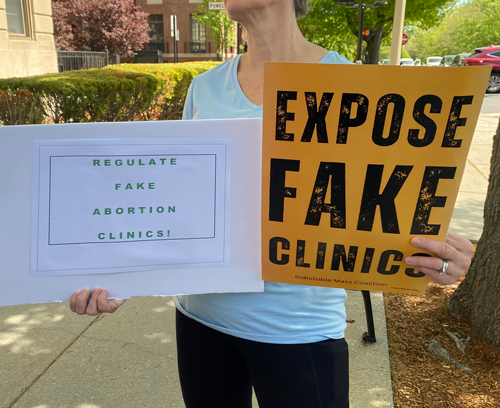May 2023
The Crisis of “Crisis Pregnancy Centers”
There are about 30 so-called “crisis pregnancy centers,” or CPCs, in the Commonwealth. They provide no medical treatment. They are unregulated. And there are twice as many of them as there are reproductive health clinics in the state of Massachusetts. Cathy Corman talks with organizers developing strategies to curb their deceptive and damaging tactics.
***
Michael S. Hutton-Woodland of Amherst asked himself what he could do two years ago when he learned that in the Commonwealth there are roughly 30 fake abortion clinics. Reproductive rights activists refer to these as “crisis pregnancy centers,” or CPCs. He wanted to bring attention to their deceptive, damaging practices. Hutton-Woodland decided to protest outside Clearway Clinic, a CPC on Columbus Avenue in Springfield. He made a sign. He sang songs.

“The first protest was just me,” he said. “I did it again a month and a half later. Some of my friends joined me. We’ve had six or seven protests at Clearway, and, you know, one time we actually had about 40 people there.”
NCJW MA has brought together several activists, including Hutton-Woodland, to form a state-wide organization concerned about the spread of these centers. The organization, Abortion Truth Campaign, or ATC, is working to promote “safe, accurate and accessible reproductive healthcare.” Leaders are coordinating with elected officials to raise awareness about the centers, which provide no medical treatment and are not regulated.
Protests are starting to happen around the state. Indivisible Mass Coalition organized nine standouts earlier this month in front of CPCs, which are located in: Attleboro, Boston, Brighton, Brookline, Burlington, Brockton, Clinton, Easthampton, Fall River, Falmouth, Fitchburg, Franklin, Greenfield, Haverhill, Lawrence, Marlborough, Natick, New Bedford, North Adams, Pittsfield, Quincy, Revere, Southbridge, Springfield, Sturbridge, and Worcester. Center names include “Your Options Medical,” “Problem Pregnancy,” and “Women’s Health Center.”
NCJW MA activists joined others at the standouts to hear speakers, hold signs, and inform passersby about the kinds of practices taking place inside. Here are some of the talking points:
- CPCs try to persuade pregnant people to carry their fetuses to term. They are particularly interested in the young and vulnerable from low socioeconomic communities. They provide free ultrasounds and promise support. Support is limited to supplies such as diapers or referrals to adoption agencies. Supplies are generally in exchange for attendance at Bible study classes.
- Those who perform ultrasounds at CPCs generally aren’t trained technicians and may miscalculate dates of fertilization to prevent pregnant people from accessing abortion legally. In addition, these unqualified “technicians” haven’t been through government-run background checks, such as the Commonwealth’s Criminal Offender Record Information (CORI) program.
- Those who staff CPCs may discuss terminating pregnancy, but they do so in the framework of health risks and emotional crisis. They assert that abortion causes infertility, leads to scarring or puncturing the uterus, and causes lasting depression and regret. Researchers have demonstrated that both medical and surgical abortions are safe and are rarely linked to any of these conditions.
- CPCs collect personal data, which they share nationally for surveillance and tracking. Some CPCs allege on their websites that they are “HIPAA-Certified,” implying that any data they collect is private and cannot be released without the consent of “patients.” There is no such thing as certification for HIPAA. It is a law which all medical practitioners must obey. Because CPCs do not actually provide medical care, they are not legally bound to safeguard names, addresses, phone numbers, email addresses, or decisions about pregnancy termination.
- CPCs have deep pockets. They are funded by the Catholic Church, right-wing evangelical Christian churches, and global organizations such as Heartbeat International.
- Organizations operating CPCs often set up shop in buildings housing medical practices to create the veneer of legitimacy as reproductive health clinics offering abortion.
- These organizations have learned to game algorithms so that their websites show up at the top of searches for medical practices providing abortions. Pregnant people traveling to the Commonwealth seeking abortion care in what they assume is the safe haven of Massachusetts may unknowingly, therefore, be lured into CPCs.
Somerville councilor-at-large and NCJW MA activist Kristen Strezo worked to pass the first ordinance in Massachusetts regulating CPCs. As of March 2022, Somerville can fine a CPC for providing false medical information. Somerville is not currently home to a CPC, and Strezo doesn’t know if the ordinance has had a chilling effect.
“Fake abortion clinics have very discreetly come into our communities, practicing these deceptive and fraudulent tactics,” Strezo said. “They pretend they are mom and pop shops. In reality, they are a front door to religious, fundamentalist Christianity. By the way, many Christians around the globe do not agree with their doctrine.”
Lawmakers in Cambridge, Salem, and Framingham have passed ordinances similar to the one in Somerville. Brookline and Newton are contemplating following suit.
Legitimate information about reproductive rights, abortion, and CPCs may be found on a website created by Gov. Maura Healey and Lt. Gov. Kim Driscoll and by the state attorney general. Should those seeking care find themselves in CPCs and receiving false and misleading information, they should file a civil rights complaint through the state’s office of the attorney general. They may access a list of legitimate abortion providers through Reproductive Equity Now.
Next month’s Deep Dive will focus on ways activists are crafting laws to regulate CPCs.

